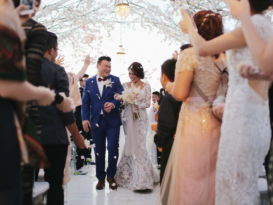Whether you plan to exchange wedding vows at Hawaii’s white-sand beaches or the Grand Canyon’s gorgeous mountain formations or Tuscany’s mesmerizing wine countries, it always pays to be mindful of the expenses that will come with your wedding plans.
While a destination wedding can make for a unique and enjoyable celebration, the cost it entails can prove to be a problem or inconvenience not only for the couple but for the guests involved. Hence, the tricky question “who pays for what” should be clearly defined right at the beginning of the wedding planning.
Airfare and Hotel Accommodation
Wedding etiquette dictates that the bride and groom are not expected to shoulder any of the guests’ airfare and hotel expenses. According to tradition however, the bride and her family may cover accommodation expenses for bridesmaids, while the groom and his family shoulder the same for the groomsmen. The couple should also cover these expenses for the wedding VIPs and other guests who may have no means to make it to the wedding, such as elderly relatives, etc.
Wedding Reception
Depending on the destination, couples hosting a destination wedding will normally offer a rehearsal dinner celebration or a welcome party for their guests. And whether it’s a five-course meal, a beer-and-burger bash, or a big barbecue party, the wedding reception is wholly covered by the couple. Destination brides and grooms also normally host a farewell breakfast or brunch the day after the big event as a thank-you for everyone who came to celebrate with them.
Transportation
The destination couple is also expected to pay for everyone’s transportation from the hotel to the ceremony venue and to the reception site. Sometimes, however, the hotel where the couple is staying covers this, including the shuttle service that will fetch the guests at the airport when they arrive.
Wedding Wear, Accessories, Hair and Makeup, Etc.
Wedding tradition requires attendants to pay for their own clothing, makeup, accessories and hair. Modern-day wedding etiquette however has the bride pegged to pay for the groom’s ring, a gift for the groom, wedding tokens for the guests, and sometimes beauty treatments for her attendants. The groom, on the one hand, should cover the bride’s engagement and wedding rings, a gift for the bride, the licensing fees, the bouquet, and the honeymoon.
Non-Wedding Activities and Expenses
Attendants should pay for any meal or drinks that are not part of the wedding festivities as well as non-wedding activities that they opt to join in (such as special trips and tours at the destination).
While a destination wedding spells for a remarkable location, an enjoyable celebration, and a holiday vacation rolled into one—and with the people you love in attendance—all to commemorate one special day, the couple should use serious judgment to determine which tab to pick and not think that everything about the destination wedding is their obligation or responsibility to pay for.
Image credits: mshpics











